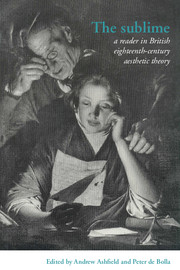Book contents
- Frontmatter
- Contents
- List of Abbreviations
- Introduction
- Part I The Longinian tradition
- Part II Rhapsody to rhetoric
- Part III Irish Perspectives
- Part IV The Aberdonian Enlightenment
- Part V Edinburgh and Glasgow
- 34 A treatise of human nature (1739-40)
- 35 A critical dissertation on the poems of Ossian (1763)
- 36 Lectures on rhetoric and belles lettres (1783)
- 37 Elements of criticism (1765)
- 38 Essays on philosophical subjects (1758/1795)
- 39 The theory of moral sentiments (1759/1790)
- 40 An essay on the history of civil society (1767)
- Part VI From the Picturesque to the Political
- Sources and further reading
35 - A critical dissertation on the poems of Ossian (1763)
Published online by Cambridge University Press: 05 June 2012
- Frontmatter
- Contents
- List of Abbreviations
- Introduction
- Part I The Longinian tradition
- Part II Rhapsody to rhetoric
- Part III Irish Perspectives
- Part IV The Aberdonian Enlightenment
- Part V Edinburgh and Glasgow
- 34 A treatise of human nature (1739-40)
- 35 A critical dissertation on the poems of Ossian (1763)
- 36 Lectures on rhetoric and belles lettres (1783)
- 37 Elements of criticism (1765)
- 38 Essays on philosophical subjects (1758/1795)
- 39 The theory of moral sentiments (1759/1790)
- 40 An essay on the history of civil society (1767)
- Part VI From the Picturesque to the Political
- Sources and further reading
Summary
Among the monuments remaining of the ancient state of nations, few are more valuable than their poems or songs. History, when it treats of remote and dark ages, is seldom very instructive. The beginnings of society, in every country, are involved in fabulous confusion; and though they were not, they would furnish few events worth recording. But, in every period of society, human manners are a curious spectacle; and the most natural pictures of ancient manners are exhibited in the ancient poems of nations. These present to us, what is much more valuable than the history of such transactions as a rude age can afford, the history of human imagination and passion. They make us acquainted with the notions and feelings of our fellow-creatures in the most artless ages; discovering what objects they admired, and what pleasures they pursued, before those refinements of society had taken place, which enlarge indeed, and diversify the transactions, but disguise the manners of mankind.
Besides this merit, which ancient poems have with philosophical observers of human nature, they have another with persons of taste. They promise some of the highest beauties of poetical writing. Irregular and unpolished we may expect the productions of uncultivated ages to be; but abounding, at the same time, with that enthusiasm, that vehemence and fire, which are the soul of poetry. For many circumstances of those times which we call barbarous, are favourable to the poetical spirit.
- Type
- Chapter
- Information
- The SublimeA Reader in British Eighteenth-Century Aesthetic Theory, pp. 207 - 212Publisher: Cambridge University PressPrint publication year: 1996



